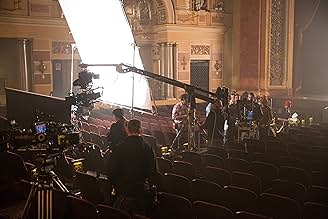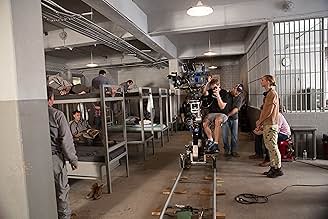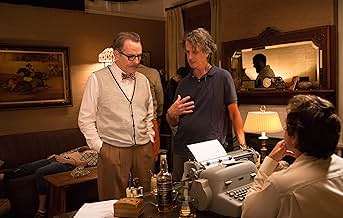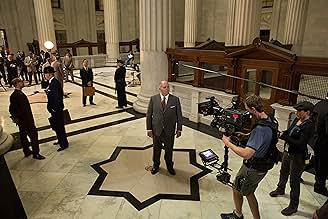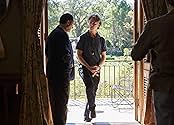En 1947, Dalton Trumbo était le meilleur scénariste d'Hollywood, jusqu'à ce que lui-même et d'autres artistes soient emprisonnés et mis sur liste noire pour leurs convictions politiques.En 1947, Dalton Trumbo était le meilleur scénariste d'Hollywood, jusqu'à ce que lui-même et d'autres artistes soient emprisonnés et mis sur liste noire pour leurs convictions politiques.En 1947, Dalton Trumbo était le meilleur scénariste d'Hollywood, jusqu'à ce que lui-même et d'autres artistes soient emprisonnés et mis sur liste noire pour leurs convictions politiques.
- Réalisation
- Scénario
- Casting principal
- Nommé pour 1 Oscar
- 8 victoires et 45 nominations au total
Toby Nichols
- Chris Trumbo (age 6-10)
- (as Tobias McDowell Nichols)
Avis à la une
I give this movie an 8 out of 10. I think, technically, it deserves a 6 or 7. It hinges on the modern notion that a biopic isn't complete unless we see all the nuances regarding the protagonist's family life. That is not necessarily the fault of the filmmakers. I don't think a picture can get funded if it doesn't adhere to these modern foibles. I give it an 8, however, and, for its purpose alone, it deserves a 10.
It takes guts to make a movie like this today.
In the United States, we tend to get comfortable and forget that the concept of freedom of speech is the most important idea any human being has ever put forth. We tend to forget that the powers that be don't like that idea.
They really, REALLY don't like that idea.
They want us lowly masses to be good little sheep and do what we're told and think exactly the way they want us to think. We tend to forget that fighting against that tendency of power is a struggle, a painful, sometimes lethal struggle. Folks in other countries know about it. They know all too well. That's why, in spite of all the other problems they may have with the U.S., they still want to live here.
But we've gotten lazy. Not only are there forces on the extreme right that would like to dictate how we live, think, and even breathe--now we have a warring faction from the left, seen most prominently on college campuses, that embraces censorship and the "shutting down" of alternative opinions like little McCarthys on methamphetamine. The concept of a "safe space," where no "offensive" opinions may be heard, is nothing short of censorship. Defenders of this nonsense often make the claim that the government is not getting involved, therefore, it's not a violation of the First Amendment. Here's what's wrong with that argument:
1. Remember our old friend Katherine Hepburn in Adam's Rib? In her closing arguments, she says the law has two parts--the letter and the spirit. It's true, by the letter of the law, students harassing and banning speakers on campus they don't agree with does not equal the federal government censoring those speakers. But it does violate the SPIRIT of the First Amendment. The government, as the film Trumbo clearly shows, cannot always be trusted to safeguard the LETTER of that particular law. It is up to us, We the People, to safeguard the SPIRIT of that law.
2. Trumbo shows us the horrific world where the government trampled on the First Amendment from the top down. What is happening on college campuses today is that violators of what is deemed "politically correct" (a phrase originating from Mao's Cultural Revolution, which should raise several alarms on that basis alone) are subjected to kangaroo courts on the campus, away from legitimate, LEGAL courts of law. They are harassed and humiliated (just as dissenters in the Cultural Revolution were) with no legal recourse. If this practice becomes accepted in normal society, we will have a political environment no different from the times depicted in the film. The only difference--this time, it we have started with the people and spread to a government ready and willing to enact "speech codes" for its own purposes.
By now, those who still, stubbornly, cling to the notion that there is nothing wrong with what is happening on college campuses today will have dismissed this review. They might even leave typical ad hominem attacks on the message boards to make what attempts they can to silence me (to kill the messenger, if you will). This should very well indicate that what I've said is true.
The sane people reading this, no doubt, are asking what the heck this all has to do with Trumbo.
Answer:
Everything.
Having been subjected to a kangaroo court on a college campus where I was called in to the Title IX office for teaching Vonnegut's "Harrison Bergeron," I couldn't help but think, as I watched Trumbo, of the horrific witch hunt I was subjected to. That the film so easily earned my empathy is a testament to how well it's made.
I wish everyone involved a long, healthy career in the movies. We need more stories like this, stories that remind us the struggle to survive as individuals in a world that so stubbornly clings to collectivism is a never-ending battle. It's happened before. It's happening now. If we don't speak up and resist, it will continue happening in the future.
It takes guts to make a movie like this today.
In the United States, we tend to get comfortable and forget that the concept of freedom of speech is the most important idea any human being has ever put forth. We tend to forget that the powers that be don't like that idea.
They really, REALLY don't like that idea.
They want us lowly masses to be good little sheep and do what we're told and think exactly the way they want us to think. We tend to forget that fighting against that tendency of power is a struggle, a painful, sometimes lethal struggle. Folks in other countries know about it. They know all too well. That's why, in spite of all the other problems they may have with the U.S., they still want to live here.
But we've gotten lazy. Not only are there forces on the extreme right that would like to dictate how we live, think, and even breathe--now we have a warring faction from the left, seen most prominently on college campuses, that embraces censorship and the "shutting down" of alternative opinions like little McCarthys on methamphetamine. The concept of a "safe space," where no "offensive" opinions may be heard, is nothing short of censorship. Defenders of this nonsense often make the claim that the government is not getting involved, therefore, it's not a violation of the First Amendment. Here's what's wrong with that argument:
1. Remember our old friend Katherine Hepburn in Adam's Rib? In her closing arguments, she says the law has two parts--the letter and the spirit. It's true, by the letter of the law, students harassing and banning speakers on campus they don't agree with does not equal the federal government censoring those speakers. But it does violate the SPIRIT of the First Amendment. The government, as the film Trumbo clearly shows, cannot always be trusted to safeguard the LETTER of that particular law. It is up to us, We the People, to safeguard the SPIRIT of that law.
2. Trumbo shows us the horrific world where the government trampled on the First Amendment from the top down. What is happening on college campuses today is that violators of what is deemed "politically correct" (a phrase originating from Mao's Cultural Revolution, which should raise several alarms on that basis alone) are subjected to kangaroo courts on the campus, away from legitimate, LEGAL courts of law. They are harassed and humiliated (just as dissenters in the Cultural Revolution were) with no legal recourse. If this practice becomes accepted in normal society, we will have a political environment no different from the times depicted in the film. The only difference--this time, it we have started with the people and spread to a government ready and willing to enact "speech codes" for its own purposes.
By now, those who still, stubbornly, cling to the notion that there is nothing wrong with what is happening on college campuses today will have dismissed this review. They might even leave typical ad hominem attacks on the message boards to make what attempts they can to silence me (to kill the messenger, if you will). This should very well indicate that what I've said is true.
The sane people reading this, no doubt, are asking what the heck this all has to do with Trumbo.
Answer:
Everything.
Having been subjected to a kangaroo court on a college campus where I was called in to the Title IX office for teaching Vonnegut's "Harrison Bergeron," I couldn't help but think, as I watched Trumbo, of the horrific witch hunt I was subjected to. That the film so easily earned my empathy is a testament to how well it's made.
I wish everyone involved a long, healthy career in the movies. We need more stories like this, stories that remind us the struggle to survive as individuals in a world that so stubbornly clings to collectivism is a never-ending battle. It's happened before. It's happening now. If we don't speak up and resist, it will continue happening in the future.
10jmsdxtr
Okay. I'll admit that I gave this film a ten because it should have a higher score altogether than the 7.3 it has, and I wanted to up it. But a solid 8 at least or even a 9, for sure. There are at least two reasons why this fine film is not getting a higher rating, I believe. One is that there are many people (including critics) who look only at it from a political standpoint, both left and right. And those on the right are not going to like it no matter what, fine acting, writing or whatever. The same in the left but conversely (and a smaller number). Secondly, this is a slow and thoughtful film that will not go over with many young viewers who are used to fast paced action and CGI content. they will find neither in Trumbo.
But, for students of history and for people who like a good story, without the fluff, it is all here. Classic good vs evil dynamics coupled with the inherent contradictions. The struggle of lost faith and eventual redemption. And perhaps mostly, excellent social dynamics especially centered around family loyalty and the struggle of holding to ones personal values.
As for the history, there is much here. As stated above more than any film ever having dealt with the subject. Films like "the Front" and "Guilty by Suspicion" are indeed good films that, especially at the time where breaking ground for a more nuanced exploration of the subject. That Trumbo is a biography is advantageous. A real biography, not a overly fictionalized and caricatured profile of the era. This despite that fact that some of the characters are fictionalized, they nonetheless represent the experiences and attitudes of real people. Louis C.K.'s Arlen Hird character being one. Dalton Trumbo may have had a better time of it than most, such as Hird. It is thought by some that the rising star of John Garfield was killed (literally-a heart attack) by the effect of the HUAC on him. This was a time, as the film states when people were fighting for their professional and personal life against what could be called a creeping fascist tendency in the US political environment. The fear and reaction and self promotion of many (ie John Wayne, Hedda Hopper et al.) is evident here.
The writing is excellent. My hat goes off to John McNamara and Bruce Cook for their adherence to historical accuracy and verisimilitude. The dialog is remarkable and keep you involved. It keeps you thinking and hits at an emotional level that few films do at all anymore. But it all comes together with the excellent direction of Jay Roach. To bring together the historical and personal is such a way is no small feat. He deserves an Oscar (as do McNamara and Cook).
I could go on...but just see the movie. You won't regret it. You can still watch Star Wars at Xmas...
But, for students of history and for people who like a good story, without the fluff, it is all here. Classic good vs evil dynamics coupled with the inherent contradictions. The struggle of lost faith and eventual redemption. And perhaps mostly, excellent social dynamics especially centered around family loyalty and the struggle of holding to ones personal values.
As for the history, there is much here. As stated above more than any film ever having dealt with the subject. Films like "the Front" and "Guilty by Suspicion" are indeed good films that, especially at the time where breaking ground for a more nuanced exploration of the subject. That Trumbo is a biography is advantageous. A real biography, not a overly fictionalized and caricatured profile of the era. This despite that fact that some of the characters are fictionalized, they nonetheless represent the experiences and attitudes of real people. Louis C.K.'s Arlen Hird character being one. Dalton Trumbo may have had a better time of it than most, such as Hird. It is thought by some that the rising star of John Garfield was killed (literally-a heart attack) by the effect of the HUAC on him. This was a time, as the film states when people were fighting for their professional and personal life against what could be called a creeping fascist tendency in the US political environment. The fear and reaction and self promotion of many (ie John Wayne, Hedda Hopper et al.) is evident here.
The writing is excellent. My hat goes off to John McNamara and Bruce Cook for their adherence to historical accuracy and verisimilitude. The dialog is remarkable and keep you involved. It keeps you thinking and hits at an emotional level that few films do at all anymore. But it all comes together with the excellent direction of Jay Roach. To bring together the historical and personal is such a way is no small feat. He deserves an Oscar (as do McNamara and Cook).
I could go on...but just see the movie. You won't regret it. You can still watch Star Wars at Xmas...
This is a well-made film, despite omitting some uncomfortable truths -- namely that Dalton Trumbo, while rightly fighting for free speech, also collaborated with the government to silence views he opposed.
Still, TRUMBO stands as a powerful indictment of McCarthyism and blacklisting -- one that feels uncannily relevant today. Those who mindlessly champion cancel culture might want to watch this film ... before they find themselves on the wrong end of the next punitive trend.
Still, TRUMBO stands as a powerful indictment of McCarthyism and blacklisting -- one that feels uncannily relevant today. Those who mindlessly champion cancel culture might want to watch this film ... before they find themselves on the wrong end of the next punitive trend.
I've seen some mixed reviews of Trumbo, and in a way I can understand why it wouldn't impress some film critics. It is a movie where the movie business, and especially movie personalities, are given over to actors to play. It's not unlike a few years ago with the Anthony Hopkins Hitchcock: you got a big cast and they all have roles to play from people who, if you're a big movie buff (or even someone who just knows who Kirk Douglas or John Wayne were, and that's probably a lot, whether or not you know who Dalton Trumbo was entirely), there's an aspect of 'Oh, he's or she is playing HIM or HER!' But I think with a sharp enough script that sort of thing goes by the way-side, especially if it gives the right actors some good stuff to play. There's nothing about Trumbo that is especially complex, as it has the message that most of us in 2015 would agree with: the Hollywood Blacklist, not just what happened to the Hollywood 10 but many others, was a horrible thing, and the thesis comes down to the idea that there were good and bad people in it but it also came down to the nature of it all making people victims... well, except for Hedda Hopper.
The movie is fun though whether or not you know a lot about the history because of who is in the cast and especially Bryan Cranston as Trumbo. He's a man who makes a lot of money in the 40's in Hollywood writing scripts and yet is an avowed Communist (he makes the case to his daughter in such a way early on in the film that some might question but most of us would go 'huh, that's it then'). A lot of the conflict comes because of what the history had right there: HUAC went after people in Hollywood who were suspected 'traitors', but in reality were just writers and (some) actors and directors who had affiliations with the party, and thanks to pressure by columnist Hedda Hopper (played here by Helen Mirren in a role that's deliciously evil) and John Wayne (actor I can't remember but does a good impression without being caricature-ish), a group got pressured. They didn't name names, were held in contempt of court, found guilty and did time. Well, unless if you were Edward G. Robinson (though he's shown in a somewhat sympathetic light, maybe just by Michael Stuhlbarg being in the role).
The bulk of the story is about the 'front' that Trumbo led for himself and other blacklisted writers such as stubborn/cancer-ridden Arlen Hird (Louis CK, always a pleasure to watch, but especially in scenes with Cranston). They used fake names to get their scripts made, even as they had no choice for a while but to team up with filmmakers who were out to just make "crap" (an echo in a way for me of Burton's Ed Wood with the John Goodman character). There's some predictable drama that unfolds - the all-business-all-writing part of Dalton that conflicts with being a father and family-man and clashing with his daughter and wife (very good Elle Fanning and Diane Lane respectively) - but what helps it along all the way is just a sharp script and direction that keeps things thematically strong.
This is serious stuff what happened to these people in Hollywood, and director Jay Roach and writer John McNamara know that, all the way up to a final speech from Trumbo upon winning a WGA award that puts things into a perspective that (almost) makes Trumbo too fair to those who really wronged him and his friends. But it's just full of wit an clever lines; if you're a sucker for that, as I can be sometimes, then Trumbo makes for a balance of the light and dark stuff. Again if nothing else, Cranston makes someone who can easily be seen as a CHARACTER in bold letters (and by many accounts that is who Trumbo was) and gives him three dimensions and perspective on the situations that unfold. He does things that may be wrong and provocative, in both bad and good ways, and is told off enough that any of his short-comings become kind of charming. I could've spent more time with his Trumbo and been happy, especially in light of the history that unfolds here (i.e. Roman Holiday, Spatacus, Exodus, other productions like The Brave One).
The movie is fun though whether or not you know a lot about the history because of who is in the cast and especially Bryan Cranston as Trumbo. He's a man who makes a lot of money in the 40's in Hollywood writing scripts and yet is an avowed Communist (he makes the case to his daughter in such a way early on in the film that some might question but most of us would go 'huh, that's it then'). A lot of the conflict comes because of what the history had right there: HUAC went after people in Hollywood who were suspected 'traitors', but in reality were just writers and (some) actors and directors who had affiliations with the party, and thanks to pressure by columnist Hedda Hopper (played here by Helen Mirren in a role that's deliciously evil) and John Wayne (actor I can't remember but does a good impression without being caricature-ish), a group got pressured. They didn't name names, were held in contempt of court, found guilty and did time. Well, unless if you were Edward G. Robinson (though he's shown in a somewhat sympathetic light, maybe just by Michael Stuhlbarg being in the role).
The bulk of the story is about the 'front' that Trumbo led for himself and other blacklisted writers such as stubborn/cancer-ridden Arlen Hird (Louis CK, always a pleasure to watch, but especially in scenes with Cranston). They used fake names to get their scripts made, even as they had no choice for a while but to team up with filmmakers who were out to just make "crap" (an echo in a way for me of Burton's Ed Wood with the John Goodman character). There's some predictable drama that unfolds - the all-business-all-writing part of Dalton that conflicts with being a father and family-man and clashing with his daughter and wife (very good Elle Fanning and Diane Lane respectively) - but what helps it along all the way is just a sharp script and direction that keeps things thematically strong.
This is serious stuff what happened to these people in Hollywood, and director Jay Roach and writer John McNamara know that, all the way up to a final speech from Trumbo upon winning a WGA award that puts things into a perspective that (almost) makes Trumbo too fair to those who really wronged him and his friends. But it's just full of wit an clever lines; if you're a sucker for that, as I can be sometimes, then Trumbo makes for a balance of the light and dark stuff. Again if nothing else, Cranston makes someone who can easily be seen as a CHARACTER in bold letters (and by many accounts that is who Trumbo was) and gives him three dimensions and perspective on the situations that unfold. He does things that may be wrong and provocative, in both bad and good ways, and is told off enough that any of his short-comings become kind of charming. I could've spent more time with his Trumbo and been happy, especially in light of the history that unfolds here (i.e. Roman Holiday, Spatacus, Exodus, other productions like The Brave One).
I happened only 70 years ago and so many young people have never even heard about it. How can it be? And, how dangerous. Not to know will always put you at a disadvantage, oh yes, sooner or later. Trumbo feels like a story set in a totalitarian Country and yet...The spread of fear is a powerful weapon used by self-aggrandizing sociopaths. Joe McCarthy's success is still a mystery to me and Trumbo proves, in the most riveting way, how easily we can fall in that trap. Bryan Cranston is simply, sensational portraying a true American in all its contradictions. I never really thought of the actual degradation Trumbo and the other blacklisted writers went through until I saw it in Bryan Cranston's face. David James Elliott portrayal of John Wayne is chilling and disturbing, specially because id true. I've heard from people who knew him, what a nice man Duke was and yet...Helen Mirren as Hedda Hopper was another chilling and unexpected portrait of utter ignorance. I've only recently found out that she was behind the forces that wanted Charles Chaplin out of the Country. Congratulations to director Jay Roach and to a spectacular cast. Let's hope everyone pays attention.
Le saviez-vous
- AnecdotesBryan Cranston revealed in a radio interview that Kirk Douglas approved of this movie, but his major complaint was that he wasn't asked to play himself.
- GaffesWhen the Oscar is presented for Best Screenplay at the 1954 Awards the presenter says, "And the Oscar goes to..." This phrase was not used by presenters until the 61st Academy Awards in 1989. In the 1950s the presenter would have said, "And the winner is..." when presenting an Oscar.
- Citations
Dalton Trumbo: Friends? What friends? Who the hell has the luxury of friends? I've got allies and enemies. There's no room for anything else.
- Crédits fousAs the credit scroll begins, photos of Dalton Trumbo, his family, and other people portrayed in the film are shown. These are followed by historical footage of Trumbo giving an interview (from the same one where he acknowledges that he is 'Robert Rich').
- Versions alternativesThe version of the movie that has been screened on Indian theaters and telecast in India is a PG-13 level cut that has been rated UA by the CBFC.
Meilleurs choix
Connectez-vous pour évaluer et suivre la liste de favoris afin de recevoir des recommandations personnalisées
- How long is Trumbo?Alimenté par Alexa
- What is the real-life story of the Hollywood blacklist depicted in "Trumbo"?
Détails
Box-office
- Budget
- 15 000 000 $US (estimé)
- Montant brut aux États-Unis et au Canada
- 7 857 741 $US
- Week-end de sortie aux États-Unis et au Canada
- 74 177 $US
- 8 nov. 2015
- Montant brut mondial
- 11 430 025 $US
- Durée2 heures 4 minutes
- Couleur
- Mixage
- Rapport de forme
- 1.85 : 1
Contribuer à cette page
Suggérer une modification ou ajouter du contenu manquant









